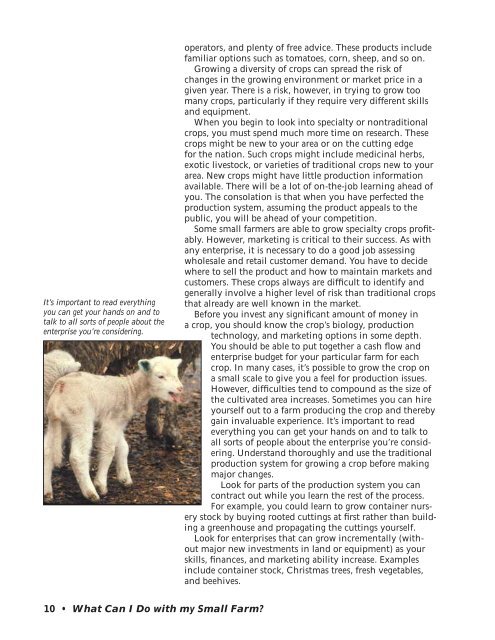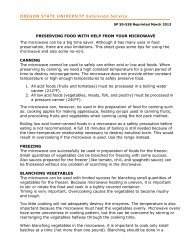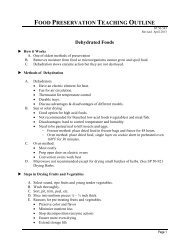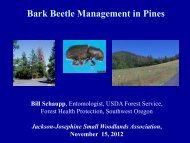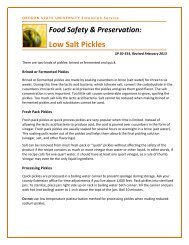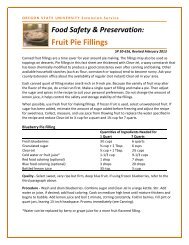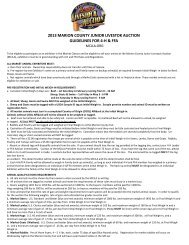What Can I Do With My Small Farm - Oregon State University ...
What Can I Do With My Small Farm - Oregon State University ...
What Can I Do With My Small Farm - Oregon State University ...
You also want an ePaper? Increase the reach of your titles
YUMPU automatically turns print PDFs into web optimized ePapers that Google loves.
It’s important to read everything<br />
you can get your hands on and to<br />
talk to all sorts of people about the<br />
enterprise you’re considering.<br />
10 <strong>What</strong> <strong>Can</strong> I <strong>Do</strong> with my <strong>Small</strong> <strong>Farm</strong>?<br />
operators, and plenty of free advice. These products include<br />
familiar options such as tomatoes, corn, sheep, and so on.<br />
Growing a diversity of crops can spread the risk of<br />
changes in the growing environment or market price in a<br />
given year. There is a risk, however, in trying to grow too<br />
many crops, particularly if they require very different skills<br />
and equipment.<br />
When you begin to look into specialty or nontraditional<br />
crops, you must spend much more time on research. These<br />
crops might be new to your area or on the cutting edge<br />
for the nation. Such crops might include medicinal herbs,<br />
exotic livestock, or varieties of traditional crops new to your<br />
area. New crops might have little production information<br />
available. There will be a lot of on-the-job learning ahead of<br />
you. The consolation is that when you have perfected the<br />
production system, assuming the product appeals to the<br />
public, you will be ahead of your competition.<br />
Some small farmers are able to grow specialty crops profi tably.<br />
However, marketing is critical to their success. As with<br />
any enterprise, it is necessary to do a good job assessing<br />
wholesale and retail customer demand. You have to decide<br />
where to sell the product and how to maintain markets and<br />
customers. These crops always are diffi cult to identify and<br />
generally involve a higher level of risk than traditional crops<br />
that already are well known in the market.<br />
Before you invest any signifi cant amount of money in<br />
a crop, you should know the crop’s biology, production<br />
technology, and marketing options in some depth.<br />
You should be able to put together a cash fl ow and<br />
enterprise budget for your particular farm for each<br />
crop. In many cases, it’s possible to grow the crop on<br />
a small scale to give you a feel for production issues.<br />
However, diffi culties tend to compound as the size of<br />
the cultivated area increases. Sometimes you can hire<br />
yourself out to a farm producing the crop and thereby<br />
gain invaluable experience. It’s important to read<br />
everything you can get your hands on and to talk to<br />
all sorts of people about the enterprise you’re considering.<br />
Understand thoroughly and use the traditional<br />
production system for growing a crop before making<br />
major changes.<br />
Look for parts of the production system you can<br />
contract out while you learn the rest of the process.<br />
For example, you could learn to grow container nursery<br />
stock by buying rooted cuttings at fi rst rather than building<br />
a greenhouse and propagating the cuttings yourself.<br />
Look for enterprises that can grow incrementally (without<br />
major new investments in land or equipment) as your<br />
skills, fi nances, and marketing ability increase. Examples<br />
include container stock, Christmas trees, fresh vegetables,<br />
and beehives.


